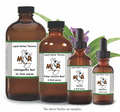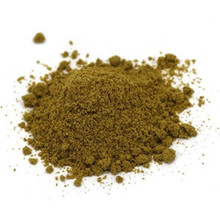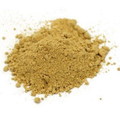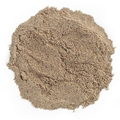 Loading... Please wait...
Loading... Please wait...- Home
- Bulk Herbs
- Herbs (A)
- Anise Seed Powder
- Home
- Herbs - Organically Grown & Wild Crafted USA
- A-B
- Anise Seed Powder
- Home
- Herbs from Hawaii
- Anise Seed Powder
Product Description
Anise Seed Powder
Also Known As - Pimpinella anisum
Organically Grown Hawaii/USA
Overview - An annual plant; the spindle-shaped, thin, woody root sends up a round, grooved, branched stem up to 1 1/2 feet high. The lowest leaves are round-cordate and long-petioled, the middle leaves are pinnate, and those at the top are incised into narrow lobes. The small, white flowers appear in compound umbels during July and August. The downy, brown ovate fruit is about 1/8 inch long and ripens during August and September. The whole plant has a fragrant odor, and the seeds taste sweet when chewed. It has a licorice-like flavor.
Medicinal Uses - Anise promotes digestion, improves appetite, alleviates cramps and nausea, cough, colds, and relieves flatulence and bad breath. Is useful as an expectorant for coughs. Anise water promotes milk production in nursing mothers, and a soothing eyewash. Said to promote the onset of menstruation when taken as an infusion. Anise oil helps relieve cramping, and spasms and is good as a stomach tonic. For insomnia, that a few seeds in a glass of hot milk before bedtime. Can be made into a salve to use for scabies or lice. A tea made from equal parts of anise, caraway, and fennel makes an excellent intestinal purifier. Because of its sweetness, anise is a good additive to improve the flavor of other medicines.
Parts Used - The whole dried “fruit” or seed
Preparations - Use the whole fruit, but the flavor is much better if the fruits are stored whole and then ground just before use them. It is known to balance the flavors of bay leaf and cinnamon.
- Infusion: use 1 tsp. crushed seed to 1/2 or 1 cup boiling water. Steep 10 minutes and strain. Take 1 to 1 1/2 cups during the day, a mouthful at a time.
- Decoction: for colic, boil 1 tbsp. seed in 1/2 pint milk for 10 minutes; strain and drink hot.
- Tincture: to prepare, add 2 oz. seed to 1/2 qt. brandy. Add some clean lemon peels and let stand in a sunny place for 20 days, then strain. Take 1 tsp. at a time.
- Anise water: boil 1/2 tsp. seed in 1/2 pint water, then strain.
Companion Plant - Licorice flavored herb, good host for predatory wasps which prey on aphids and it is also said to repel aphids. Deters pests from brassicas by camouflaging their odor. Improves the vigor of any plants growing near it. Used in ointments to protect against bug stings and bites. Good to plant with coriander.
Precautions - Avoid Anise Seed Herbal Supplement if you have an allergic or inflammatory skin condition. Anise should not be used when taking iron supplements or blood thinners (Coumadin, Wafarin®, etc.). Large doses of anise can act as a narcotic in the system. Excess usage must be avoided, especially in babies. Excess dosage might lead to dehydration. Women in the first term of pregnancy must also abstain from taking anise, with the exception of minute amounts.
Disclaimer - These products are dietary supplements and are not intended to diagnose, treat cure or prevent any disease. Reviews are not intended as a substitute for appropriate medical care or the advice of a physician or another medical professional. Actual results may vary among users. Mountain Maus Remedies LLC makes no warranty or representation, expressed or implied, as to the accuracy or validity of the information contributed by outside product review submissions, and assumes no responsibility or liability regarding the use of such information. The information and statements regarding the dietary supplements have not been evaluated by the Food and Drug Administration. If you have a medical condition or disease, please talk to your health care provider. If you are currently taking a prescription medication, you should work with your health care provider before discontinuing any drug or altering any drug regimen, including augmenting your regimen with dietary supplements. Do not attempt to self-diagnose any disease or ailment based on the reviews and do not use the information contained herein for diagnosing or treating a health problem or disease. Proper medical care is critical to good health. If you have a health concern or suspect you have an undiagnosed sign or symptom, please consult a physician or health care practitioner.
















